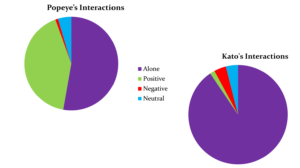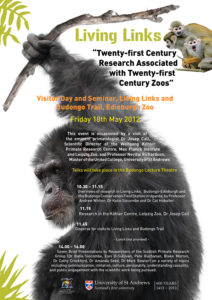The Evolutionary and Developmental Origins of Inquiring Minds: Studies of Causal Reasoning; Curiosity and Executive Control Supported by the European Research Council (2015-2020)
Dr Amanda Seed – University of St Andrews
Human technology is vastly superior to that of other apes: human tools from telescopes to the Large Hadron Collider exploit causal relationships but also explore them. What change over the brief course of hominid evolution made for such a big difference? Experiments are ongoing to compare humans and other primates to address this question covering two broad lines of study: causal cognition and executive function.
The Cog in the Ratchet: Illuminating the Cognitive Mechanisms Generating Human Cumulative Culture Supported by the European Research Council (2015-2020)
Prof Christine Caldwell – University of Stirling
In human populations, skills and knowledge accumulate over generations, giving rise to behaviours and technologies far more complex than any single individual could achieve alone. This ratchet-like property of human culture appears absent in nonhuman species, as socially transmitted behaviours in animal populations are generally no more complex than those that can be acquired by trial and error. The aim of the RATCHETCOG project is to systematically investigate the cognitive capacities implicated in cumulative culture..
Rethinking Mind and Meaning: A Case Study from a Co-Disciplinary Approach Supported by the Arts and Humanities Research Council (2015 – 2016)
Dr Juan-Carlos Gomez, Dr Amanda Seed, Derek Ball, Prof Herman Cappelen, Prof Deirdre Wilson & Prof Klaus Zuberbühler
Understanding thought and communication in animals and non-verbal human infants perplexes linguists, philosophers, psychologists and biologists. This project will bring together these researchers to consider how we might progress our understanding of what thought is, the distinctions between human and animal minds, and the relation between thinking and communicating.
Exploring the evolutionary roots of cultural complexity, creativity and trust Supported by the Templeton Foundation, USA – 2013-2016
Studying the capuchins- Prof Andrew Whiten, Dr Lara Wood, Dr Lewis Dean and PhD student Jenny Botting (University of St Andrews) plus wider collaborators.
A series of studies with children, chimpanzees and Living Links’ capuchins to investigate human beings apparently unique capacity for cumulative culture; the ability to accumulate knowledge, and improve technology, over time.
Past Projects
The role of intentions and physical knowledge in the origins of causal reasoning Supported by the Economic and Social Research Council (2013-2014)
Studying capuchins, chimpanzees and children – Dr. Amanda Seed, Dr Daphna Buchsbaum, Dr Emily Messer and Dr Emma Tecwyn (University of St Andrews)
Evolution and Development of Prosocial Behaviour
Supported by the Templeton Foundation, USA – 2011-2012.
A study of the motivation and capacity to act in the interests of others, in capuchin monkeys, chimpanzees and children
Prof Andrew Whiten, Dr Nicolas Claidière (University of St Andrews) Dr Nicola McGuigan and PhD student Lea Dollbaum (Heriot-Watt University, Edinburgh).
Learning and imitation in capuchin monkeys
PhD project
Eoin O’Sullivan (University of Stirling). Supervisor: Dr Christine Caldwell.
Visual pattern learning in primates
Supported by the European Research Council
Using touchscreens to study pattern learning and physiological correlates in squirrel monkeys and chimpanzees
Ruth Sonnweber, Prof Tecumseh Fitch (University of Vienna). Host: Prof Andy Whiten.
Inhibition and the Understanding of Causality
PhD project
Carolina Mayer (University of St Andrews) Supervisor: Dr Amanda Seed.
Living Links to Human Biology and Medicine
Supported by the Wellcome Trust – 2012-2013
Extending our Public engagement with Science programme and evaluating its impact.
Prof Andrew Whiten, Dr Mark Bowler (University of St Andrews), Prof Hannah-Buchanan-Smith (University of Stirling) and Stephen Woollard (Head of Education, RZSS).
Social learning and behaviours of capuchin and squirrel monkeys
PhD project (completed 2013)
Emily Messer (Univ St Andrews) Supervisor: Prof Andy Whiten.
‘Communication with regards to food quality’ – Supported by the Japan Society for the Promotion of Science Observational and experimental studies of capuchins
Dr Hiroki Koda (Kyoto University, Japan). Host: Prof Klaus Zuberbuhler, Universities of St Andrews and Neuchatel.
Understanding of goal-directed actions and goals in capuchin monkeys – PhD project Ruoting Tao (University of St Andrews). Supervisor: Dr Juan-Carlos Gomez
Personality and Social Intelligence – PhD project – Blake Morton (University of Stirling). Supervisors: Prof Phyllis Lee and Prof Hannah Buchanan-Smith.
Preferences for faces and facial attractiveness – PhD project – Jack Griffey (University of Stirling). Supervisors: Dr Tony Little, Prof Hannah Buchanan-Smith.
Predictability of husbandry routines: impact on welfare in capuchins – MSc project – Kristina Rimpley (University of Stirling). Supervisor: Prof Hannah Buchanan-Smith
Anointing Behaviour in Capuchin Monkeys – Supported by the Wellcome Trust 2011-2012 – Experimental studies on the social aspects of ‘fur rubbing’ behaviours in capuchin monkeys – Dr Mark Bowler, Emily Messer & Prof Andrew Whiten (University of St Andrews)





